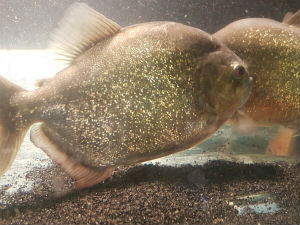
How much does a piranha weigh?
 The weight of a piranha fish varies depending on the species and the individual fish itself. However, most piranha fish weigh less than two pounds. It is important to note that the weight of a piranha fish can also be affected by its diet and its environment. Piranha fish that live in areas with abundant food will tend to be heavier than piranha fish that live in areas with limited food. Overall, piranha fish are relatively small fish, with most species weighing less than two pounds. However, the black piranha can grow to be quite large, weighing up to seven pounds.
The weight of a piranha fish varies depending on the species and the individual fish itself. However, most piranha fish weigh less than two pounds. It is important to note that the weight of a piranha fish can also be affected by its diet and its environment. Piranha fish that live in areas with abundant food will tend to be heavier than piranha fish that live in areas with limited food. Overall, piranha fish are relatively small fish, with most species weighing less than two pounds. However, the black piranha can grow to be quite large, weighing up to seven pounds. How much does a piranha weigh?
Piranha weights vary greatly depending on the species. Most piranha species weigh between 1-8 ounces on average. The largest piranha can weigh up to about 7 pounds.
What is the heaviest piranha species?
The largest piranha species is the black piranha (Serrasalmus rhombeus), which can grow to be up to 18 inches long and weigh up to seven pounds. However, most black piranhas are much smaller, weighing around two pounds.
Other piranha species, such as the white piranha (Pygocentrus cariba) and the spotted piranha (Pygocentrus piraya), are even smaller, weighing around half a pound or less.
How heavy can pet piranhas get?
Common pet piranha species like reds and blacks can reach about 0.5-1 pound in weight when fully grown. Giants like the Pygocentrus nattereri can weigh slightly more when mature. Proper diet and care is needed.
What factors affect piranha weight?
Age, health, species, and diet impact the weight of a piranha. Wild fish weigh more on average than aquarium-kept piranhas due to greater food availability and exercise.
Are male or female piranhas heavier?
Among most species, male piranhas tend to be slightly heavier than females of the same age. Males often reach larger maximum sizes which correlates with greater weight.
How quickly can piranhas gain weight?
With a protein-rich diet and proper conditions, young piranhas may gain up to a few ounces per month. Growth and weight gain slows as they near maturity.